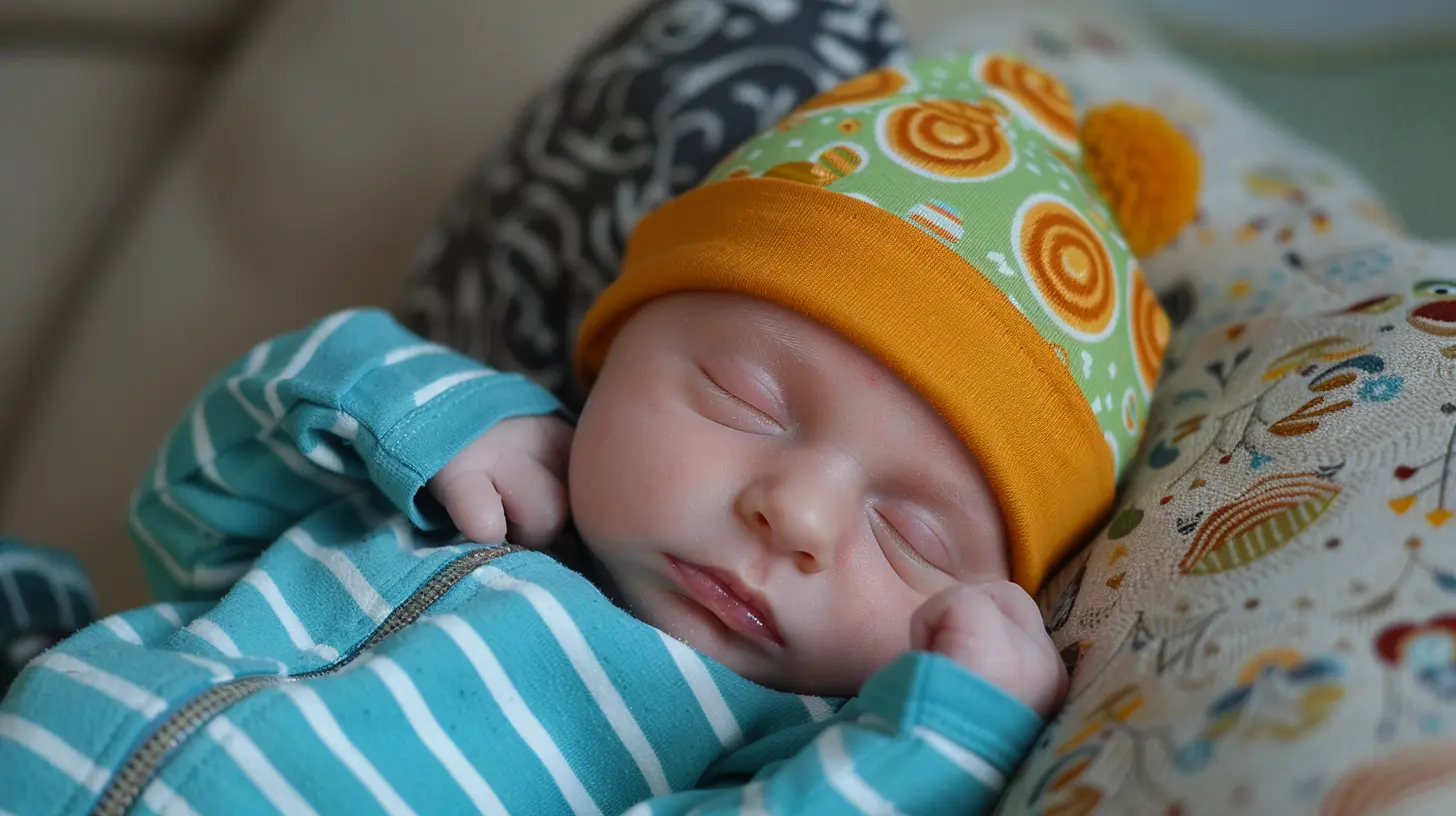Daytime Naps: Do They Affect Your Baby’s Nighttime Sleep?
1 May 2025
Ah, the magic (and sometimes mystery) of baby sleep! As a parent, you’ve probably wondered whether those daytime naps are messing with your little one’s nighttime rest. Should you keep them short? Let them sleep as long as they want? Or are naps the reason your baby wakes up at 3 AM—wide-eyed and ready to party?
Let’s dive deep into the world of baby naps and how they impact nighttime sleep. 
The Role of Daytime Naps in Baby Sleep
Naps are crucial for babies. Unlike adults, infants and toddlers can’t power through long days without rest periods. Their tiny bodies and developing brains need downtime to process the world around them.But here’s where it gets confusing: Many parents assume that skipping naps will lead to longer nighttime sleep. This isn’t always true. In fact, overtired babies often sleep worse at night. Yep, it sounds backward, but an exhausted baby can be harder to settle and may wake up more frequently.
So, how do you strike the right balance? 
How Much Daytime Sleep Does Your Baby Need?
The amount of sleep a baby needs changes as they grow. Here’s a quick guideline based on age:| Age | Daytime Naps | Total Sleep Needed (24 hours) |
|---------|----------------|--------------------------------|
| Newborn (0-3 months) | 4-6 naps | 14-17 hours |
| 3-6 months | 3-4 naps | 14-16 hours |
| 6-9 months | 2-3 naps | 13-15 hours |
| 9-12 months | 2 naps | 12-14 hours |
| 12-18 months | 1-2 naps | 11-14 hours |
| 18+ months | 1 nap | 11-13 hours |
Your baby’s needs may vary, but if they’re getting less sleep than recommended, overtiredness can start creeping in. 
Can Too Many Naps Affect Night Sleep?
Yes, naps can impact nighttime sleep—but it depends on your child’s age and total sleep needs.Here’s where things get tricky: If a baby naps excessively during the day, they may not be tired enough for a full night’s sleep. This can lead to bedtime battles, frequent night wakings, or early morning wake-ups.
So, what’s the key? Balance. It’s all about finding the sweet spot where your baby gets enough daytime rest without interfering with their nighttime routine. 
Signs Your Baby Is Napping Too Much
Not sure if your baby’s nap schedule is affecting their night sleep? Watch for these signs:- Bedtime struggles: If your baby suddenly resists bedtime, long naps could be the culprit.
- Middle-of-the-night wake-ups: If your little one is wide awake at 2 AM, they might not need as much sleep overnight.
- Early morning wake-ups: If they’re up at the crack of dawn, their naps might need adjusting.
- Long stretches of alertness before bedtime: If your baby is full of energy right before bed, they might be sleeping too much during the day.
If you notice these signs, consider tweaking the nap schedule—but don’t eliminate naps altogether!
What Happens If Your Baby Doesn’t Nap Enough?
On the flip side, if your baby doesn’t get enough daytime sleep, things can get rough. Sleep deprivation in babies often leads to:- Increased fussiness and crankiness
- Difficulty settling at bedtime
- Shorter nighttime sleep with more wake-ups
- Trouble feeding due to overtiredness
- More frequent meltdowns during the day
Skipping naps entirely or shortening them too much can backfire, leading to a miserable baby who struggles to fall asleep at night.
How to Create a Healthy Nap Schedule
So, how do you find the perfect nap routine that supports good nighttime sleep? Here are some tips:1. Follow Age-Appropriate Wake Windows
Wake windows are the time your baby can stay awake before needing another nap. If they stay up too long, they’ll get overtired, making it harder to settle.Typical wake windows by age:
- Newborns (0-3 months): 45 minutes to 1.5 hours
- 3-6 months: 1.5 to 2.5 hours
- 6-9 months: 2.5 to 3 hours
- 9-12 months: 3 to 4 hours
- 12-18 months: 4 to 5 hours
Keep an eye on sleepiness cues like rubbing eyes, yawning, or fussiness—they're signs your baby is ready for a nap!
2. Keep Naps Consistent
Try to have naps around the same time each day. Babies thrive on routine, and irregular nap schedules can throw off nighttime sleep.3. Avoid Late Afternoon Naps
Long naps too close to bedtime can interfere with sleep. If your baby still needs an evening nap, aim for a short power nap instead of a long snooze.4. Keep the Last Wake Window Longer
The final window before bedtime should be the longest to ensure your baby is properly tired.5. Create a Calm Pre-Nap Routine
Just like a bedtime routine, having a short and predictable wind-down routine before naps (soft music, dim lights, a book) helps signal sleep time.What If Your Baby Is Struggling With Naps?
If your baby fights naps or won’t settle, try these tricks:- Ensure a dark, quiet sleep environment (blackout curtains work wonders)
- Use white noise to block out background sounds
- Stick to a consistent routine
- Watch for early sleep cues to avoid overtiredness
- Offer a short nap rescue if they miss a nap (e.g., a stroller or car ride)
If you’re following these best practices and your baby still struggles with naps, don’t stress too much. Some babies naturally take shorter naps but make up for it with better night sleep.
Final Thoughts
So, do daytime naps affect your baby’s nighttime sleep? Absolutely! But it’s all about balance—enough daytime rest to avoid overtiredness but not so much that it interferes with night sleep.If bedtime struggles, night wakings, or early risings become frequent, take a closer look at your baby’s nap schedule. With a little adjustment and consistency, you’ll find the perfect nap balance that supports solid nighttime sleep.
And remember—every baby is different! What works for one might not work for another. Follow your baby’s cues, experiment with different nap lengths, and trust your instincts.
Because a well-rested baby = a well-rested parent!
all images in this post were generated using AI tools
Category:
Baby SleepAuthor:

Maya Underwood
Discussion
rate this article
4 comments
Thorne Kim
Balance naps for better nights!
May 17, 2025 at 3:40 PM

Maya Underwood
Thank you for your insight! Finding the right balance in nap duration can indeed contribute to better nighttime sleep for babies.
Lisette Martinez
Oh sure, let’s just ask the baby if they prefer napping or nighttime chaos!
May 3, 2025 at 4:22 PM

Maya Underwood
Great point! While babies can’t voice their preferences, research shows naps can significantly impact nighttime sleep patterns.
Kade McConnell
Daytime naps are vital for your baby's growth and development! A well-rested little one leads to peaceful nights. Embrace the rhythm of rest, and enjoy the journey!
May 1, 2025 at 4:27 PM

Maya Underwood
Thank you for your insightful comment! You're absolutely right—daytime naps play a crucial role in a baby's overall well-being and can significantly impact their nighttime sleep. Embracing a consistent napping routine is key!
Kate Bailey
Absolutely! Daytime naps are like little power-ups for babies, boosting their mood and development. A well-rested baby often means a happier night for everyone. Embrace those nap times, and remember that every little one has their own unique sleep rhythm! You've got this!
May 1, 2025 at 2:28 AM

Maya Underwood
Thank you for your insightful comment! Naps are indeed crucial for a baby's development and can positively impact nighttime sleep. Every child's rhythm is unique, so it's important to find what works best for each little one.



